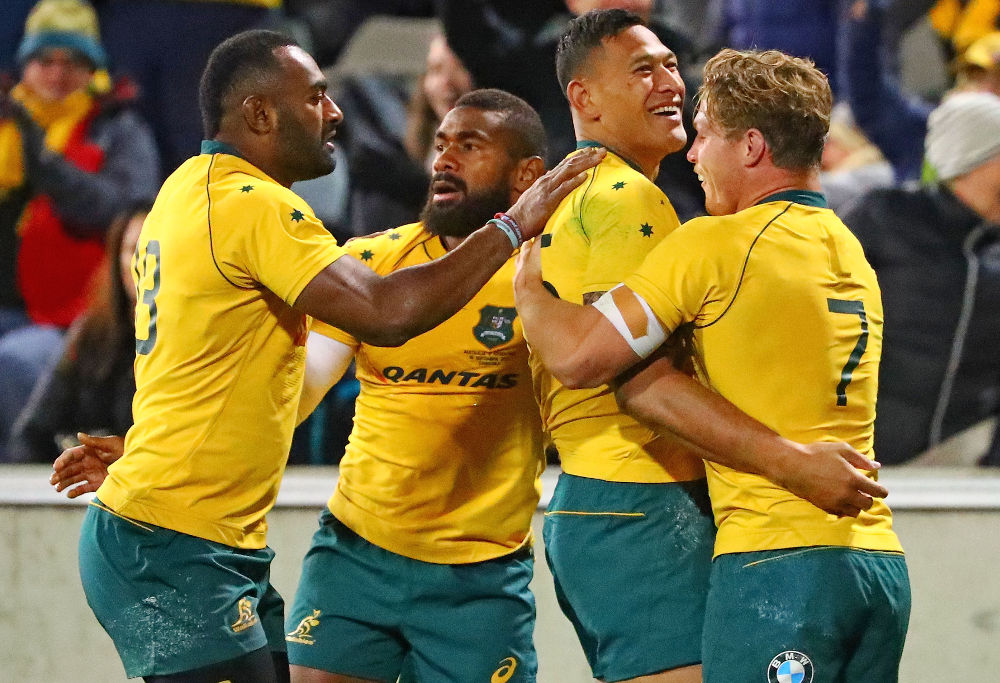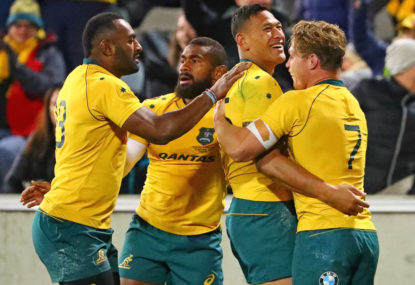If there’s one thing the Wallabies have managed to do well in recent seasons, it’s frustrate the hell out of rugby fans with their inability to string together anything even remotely resembling consistent performances.
At different times this season, the Wallabies have looked very good in attack. They’ve dominated the breakdown contest. They’ve been rock solid in the scrum and accurate in the lineout. Their defence has been excellent.
Unfortunately, the key words there are ‘at different times’. None of those events have happened in unison, nor across an 80-minute performance. The best we’ve endured has been a couple of those aspects, and only for periods within a game.
People look at empty seats and fall into their favourite stereotypes to take pot-shots at the host city, but the reality is, why would anyone hand over their hard-earned for the privilege of watching a performance lottery that will almost certainly bear no resemblance to the week before?
So it was forehead-into-the-wall time during the first half on Saturday night, when the Wallabies decided that one-out runners and trucking it up was going to be the way to beat Argentina. There was no urgency to support the ball carrier, and no second thought from the ball carrier to look for an offload, let alone get an arm free to see it was even possible.
It was as much through luck as it was good management that Australia managed to hold possession, because yet again, there wasn’t a great deal of urgency at the attacking breakdown. And whenever the Pumas did get the ball, they immediately looked dangerous simply because they were aware of the concept of second-phase play.
It was infuriating, and for numerous reasons.
Firstly, the Wallabies had already proven to themselves – in this very tournament, this very season – that supporting the ball-runner and looking for offloads was effective against even the best defences in the game. They did that against New Zealand in Dunedin (but certainly not Sydney), and they did it against South Africa in Perth last weekend.
But not in Canberra – at least not for most of the first half, bar the build-up to Israel Folau’s first try, when Sean McMahon and Bernard Foley combined and offloaded well to create the space for Folau on the right wing.
Secondly, this is infuriating because we say the same thing about the Wallabies a couple of times a year. How is it even possible for a team to forget about an aspect of their game that had been working well?
And it’s not just a Wallabies thing, even; this is an ingrained deficiency in all Australian teams at the professional level, something that flies in the face of this supposed ‘Australian way’ of playing rugby that every coach seems to want to follow, but few actually do with any consistency.

(Photo by Scott Barbour/Getty Images)
Here’s something I wrote last July, on the occasion of all five Australian Super Rugby sides losing on the same weekend for the first time ever:
“One common element in the five Australian losses, was a chronic lack of second-phase play. Offloads were occasional events, rather than distinct plans, as the Australian players across the weekend hit the ball up directly into defensive walls with no real intent to look sideways.
“If that sounds familiar, it’s because it is. I’ve essentially summarised the Wallabies’ game plan for the first and third Tests against England last month. Despite enjoying upwards of 70 per cent of possession at times in both Tests, the Wallabies continued their ultimately futile attempts at blasting their way through the England defence.”
[latest_videos_strip category=”rugby” name=”Rugby”]
What’s curious about all this is that the offload and second-phase are vital for teams in the NRC, and by and large, all teams use them well. It would seem the offload is either coached out of players at Super Rugby and international level, which makes no sense, or the players themselves forget about having the ability, which makes even less sense.
Regardless, it was good to see the Wallabies found the missing urgency that Michael Cheika alluded to after the match, and they properly put the Pumas away in a second-half performance that belied the first.
Cheika is annoyed about this himself, which is at least something. He said post-match he didn’t need to give them a rocket at halftime, because they were doing it themselves by the time he got down to the dressing room.
“I know that we can do that. I’d like to see it every week; that consistency,” he said.
We’d all like to see it, Michael.
The problem now is how to get that message to sink in. There can’t be further repeats of unurgent starts to Tests, and a complete lack of second phase. It’s not good enough, and it certainly doesn’t draw people to the game, as we’re seeing all too often.
My hope is that in 12 months’ time, I won’t be again looking back at this article as precedent for a chronic issue that still plagues the Wallabies and Australian rugby in general. My fear, worryingly, is that I will.






























































































